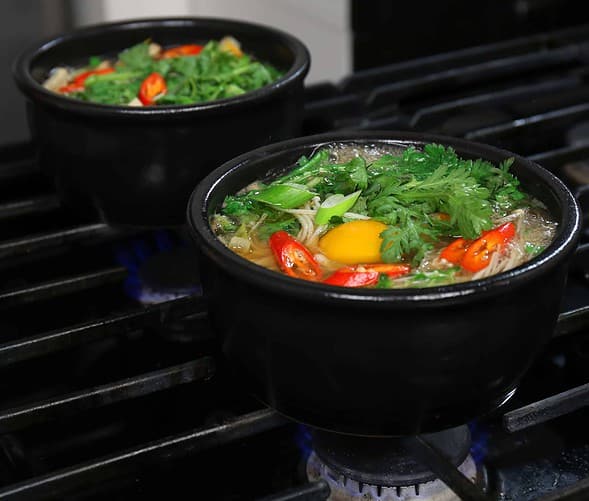3/26/17
Bulgogi stew in an earthenware pot
Now that winter is almost here, I’m going to show you a hearty, delicious, meaty dish called ttukbaegi-bulgogi (뚝배기불고기) that’s great for cold weather. It’s a stew made with bulgogi (Korean marinated beef) cooked in a Korean earthenware pot (a ttukbaegi, also sometimes translated as a “stone bowl” in English). You might have had bulgogi cooked as BBQ on a grill at a Korean restaurant, but in ttukbaegi-bulgogi it’s cooked and served in a stew in a sizzling hot traditional Korean eartheware pot.
It takes a while for earthenware to heat up, but once it’s heated, it keeps warm for a long time. So when you first take your ttukbaegi-bulgogi off the stove it will be sizzling and bubbling, and it’ll keep warm as you eat it, all the way down to the bottom. It’s not totally mandatory to have a ttukbaegi for this dish, and you can use a metal pot if you want.
Advertisement
I use beef skirt steak in my video, but you can use pre-cut bulgogi beef for bulgogi from a Korean grocery store if it’s easier for you. I also huge a wide variety of vegetables in this recipe, but don’t feel like you have to use everything I use. You can use whatever vegetables you like and that are available to you, but I would recommend that you don’t skip the onion.
And you can also make a vegetarian version of this dish by substituting the skirt steak for King oyster mushrooms. Check out the recipe below. Happy cooking!

Ingredients
For 1 serving


- 8 ounces beef skirt steak (or tenderloin, any tender cuts of beef), sliced thinly
- 1 tablespoon soy sauce
- 2 garlic cloves, minced
- 2 teaspoons sugar
- 2 teaspoons honey
- ¼ teaspoon ground black pepper
- 1 teaspoon sesame oil
- 1 ounce starch noodles (dangmyeon), soaked in cold water 30 minutes to 1 hour
- ½ teaspoon fish sauce
- ½ teaspoon salt
- 1 ounce (¼ cup) onion, sliced
- 1 ounce (¼ cup) carrot, cut into matchsticks
- 2 ounces large green onion (or 2 green onions), sliced diagonally.
- 1 ounce (about 1/3 cup) Enoki mushrooms
- 1 ounce (about ½ cup) chrysanthemum greens (ssukgat), washed with the stems removed. If it’s not available, replace it with spinach or some basil leaves.
- 1 egg (optional)
- ¼ cup worth radish sprouts (optional)
- 1 red chili pepper (optional), sliced thinly
Advertisement
Spicy mixture (optional, for a spicy version):
2 teaspoons hot pepper flakes mixed with ½ teaspoon sesame oil in a small bowl.
Directions
- Combine soy sauce, garlic, sugar, honey, ground black pepper, and sesame oil in a bowl. Mix it well until the sugar is dissolved. Add the beef and mix well to marinate. Cover and refrigerate.
- Place an earthenware pot (ttukbaegi) on the stove with 2 cups of water, salt, and fish sauce. Bring to a boil.
- When it starts boiling, add the beef, onion, carrot, and the large green onion. Let it cook without the lid for about 10 to 12 minutes over high heat. Stir it a few times and remove any foam from the surface with a spoon.


- Add the noodles, stirring a few times, and cook for 1 minute. Add Enoki mushrooms and radish sprouts and cook for a few minutes. Crack an egg and put it in the center of the bubbling stew. Garnish with the chrysanthemum greens and the red chili pepper.


- Remove from the heat and serve with rice, kimchi, and a few more side dishes. If you want the spicy version, put some of the spicy mixture into the stew and mix it in.


Vegetarian version: Bulgogi mushroom stew
The recipe is almost the same as beef version but the beef is replaced with mushrooms. And in the broth, leave out he fish sauce and increase the salt to 1 teaspoon (from ½ teaspoon). And skip the egg!


